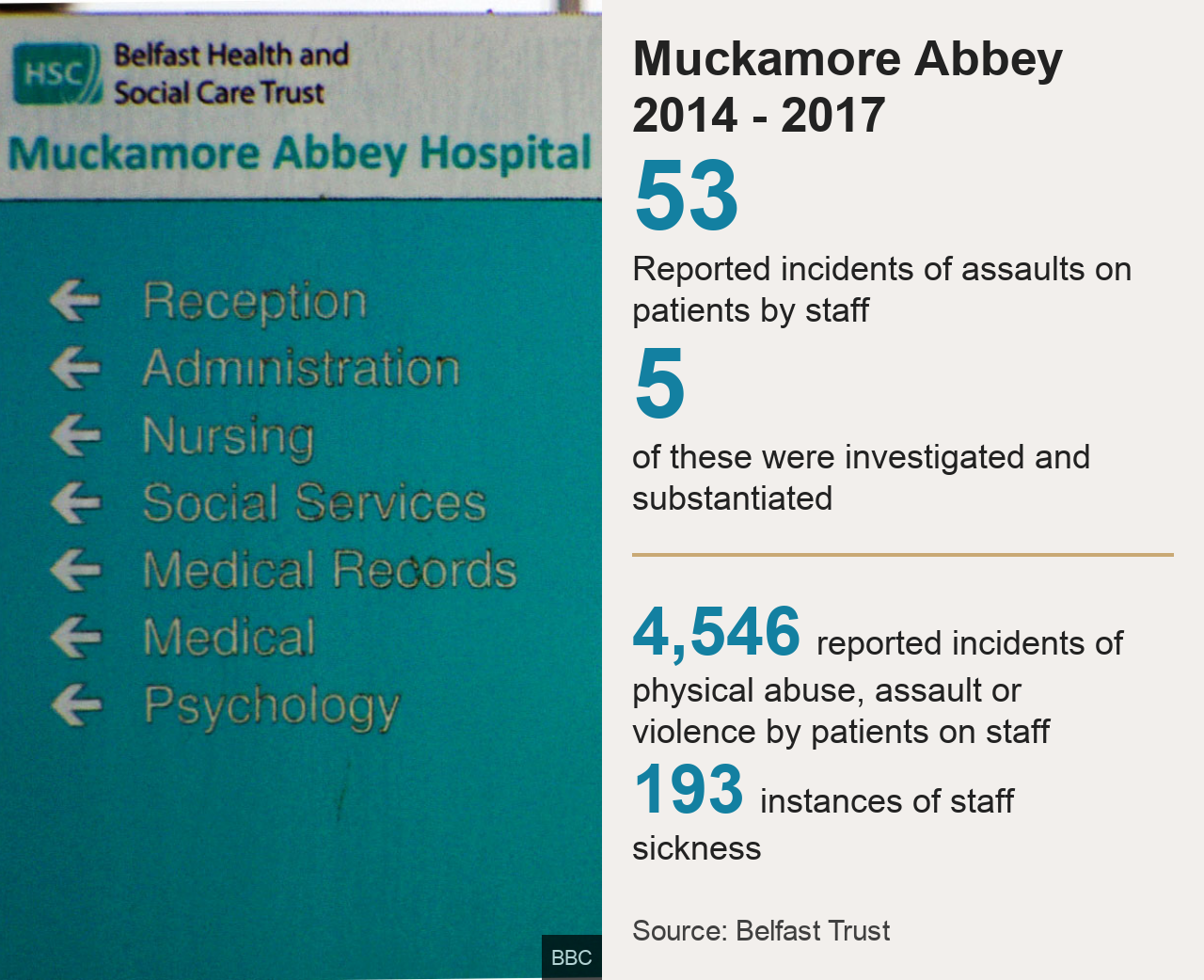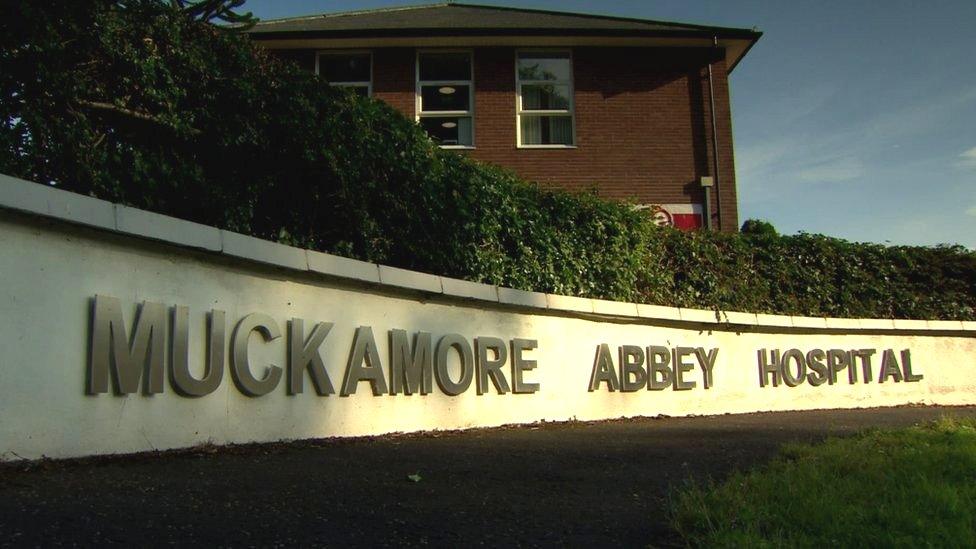Muckamore Abbey report lists 'catastrophic failings'
- Published

The report on Muckamore Hospital lists 'catastrophic failings'
A review surrounding the protection of vulnerable adult patients at Muckamore Abbey Hospital has found that many lives were compromised.
The report, seen by the BBC, charts a series of catastrophic failings and found there was a culture of tolerating harm.
Its authors say it is "shattering that no-one intervened to halt the harm and take charge".
The Belfast Trust said its senior staff are meeting with the affected families.
The RQIA - the health services regulator - said the findings were "shocking".
CCTV in the hospital's Psychiatric Intensive Care Unit (PICU), showed patients being harmed by staff, but no safeguarding referrals were made and no members of staff spoke out.
In fact, most people working there were unaware that the cameras were switched on.

The review, A Way to Go, commissioned by the Belfast Health and Social Care Trust (BHSCT), looked at safeguarding at the County Antrim hospital between 2012 and 2017.
Safeguarding is the process of protecting people from abuse or neglect and preventing impairment of their health and development.
The report's findings are:
Patient's lives were compromised.
Safeguarding protocols were not followed by staff;
CCTV footage showed patients being harmed by staff - and staff did not speak out;
The use of the seclusion room was not monitored;
Patients were significantly likely to be harmed by peers;
The routine practice of involving the PSNI in all safeguarding discussions is "bewildering";
Leadership is distributed and not being used to benefit hospital patients.
The review states that patients' families are "distressed and angry" that nobody intervened to halt the harm and that even the possibility of patients being harmed was denied and deemed implausible by hospital managers and the RQIA.
Nine families are directly affected; seven are engaging with health trust officials.

Analysis
Report makes for grim reading with many questions left unanswered
Against a backdrop of Brexit and the prospect of political uncertainty drops this review of Muckamore Abbey Hospital.
It confirms many families' worst fears and must not be allowed to be lost in a deluge of other news.
It is a distressing read. Many people, including the most senior of healthcare professionals, should be hanging their heads in shame.
It is grim, it is upsetting, but it has been the reality for some of our most vulnerable adults who rely on a system to help them live with dignity and respect.
Some of the families are embarrassed and feel guilty that they left their children - who are now adults - in the care of Muckamore.
But they should not feel guilty. They believed they were doing the right thing. It was the system that let their children down.
Most of the parents do not want this swept under the carpet. They want the public to know what has been going on.
How did it happen? Why did some staff who witnessed the abuse not speak out?
Why did the most senior of staff not endeavour to find out how the hospital was being run when they were not around?
What good is the Regulation and Quality Improvement Authority (RQIA) if they miss something as significant as this? After all, the CCTV cameras were installed but who was checking them?
There are so many questions.
Some families told the BBC that only a public inquiry would find the answers. They believe their children, who have no voice to speak out for themselves, deserve nothing less.

Thirteen members of the nursing staff have been suspended and two senior nursing managers are off on long-term sick leave.
The BBC understands that one offered to retire early. Eight people have been referred to the nursing and midwifery council.
In a damning conclusion of how Northern Ireland supports infants and children with learning disabilities, autism and complex medical challenges, the report says services are poorly supported and families do not view the hospital as their future.
It also confirms what many families have repeatedly said - that the hospital is being used for institutionalised/long-term use as opposed to short-term admissions and the treatment for which it was intended.
In fact, a number of patients were in the PICU unnecessarily as there was not a suitable home-care package for them in the community.
The report emphasises that the care model is out of date.
It says that events that did come to light in the CCTV footage were initially denied and it was even claimed that these were implausible.
Some hospital records are missing, including records of staff who had been previously subject to a disciplinary process.
The report's authors include Dr Margaret Flynn, who oversaw the review into the 2012 Winterbourne View hospital scandal which saw six care workers jailed.

Two recommendations are made in the report, one of which underlines the importance of understanding that "ordinary lives require extraordinary support".
The other states that long-term vision for services for people with learning disabilities and autism is required.
Belfast Trust has also admitted that it made mistakes and did not react in time.
In fact, the BBC understands alarm bells did not start ringing until some officials in the Department of Health realised something bad was going on.
In a statement to BBC News NI, it said senior Trust staff members are meeting individually with families of those affected "in order to share the final report of the review team".
"The Trust is committed to sharing this final report with families first before making further comment."
The RQIA also comes in for criticism in the report as it says there is no evidence of an "over-arching view of the hospital".
Recommendations from the RQIA remain outstanding from one inspection to another.
'Appalled'
There is no requirement for the RQIA under the Mental Health (NI ) Order 1986 to inspect mental health or learning disability wards.
Families have questioned the extent of the RQIA's powers if it claims it does not oversee Muckamore.
The Bamford review set out to do just that 14 years ago.
While 2,500 people have been resettled in the community in that period, 80 patients remain.
Olive Macleod, RQIA chief executive, said she was "appalled" at the treatment meted out to patients.
"The safeguarding failures at the Belfast Trust's Muckamore Abbey Hospital, as described in this review, are shocking. As a nurse, I am appalled that the most vulnerable in society were subjected to such degrading and inhumane treatment by fellow nurses and health care workers," she said.
- Published10 December 2018

- Published26 July 2018
